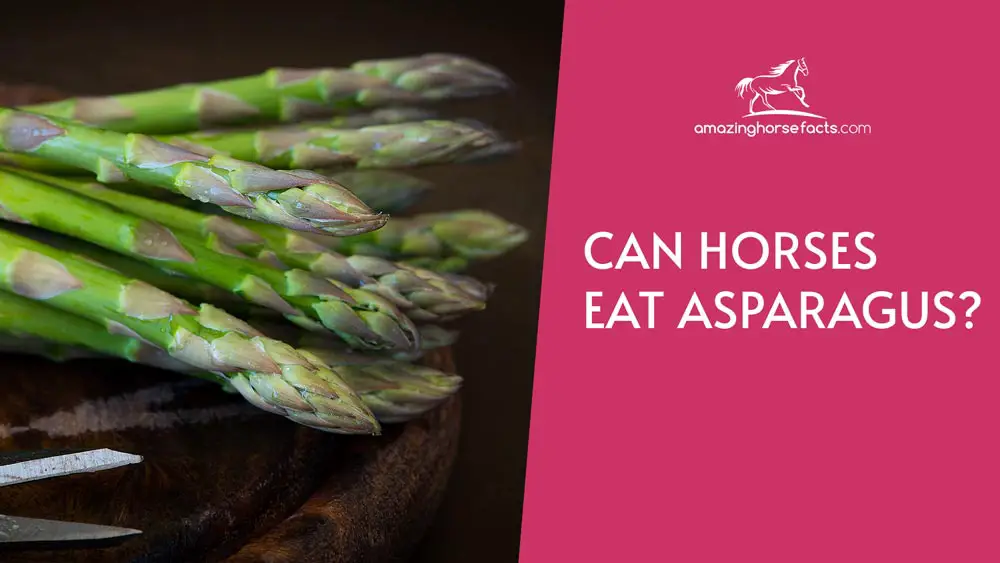Skip To Section

Can Horses Eat Asparagus?
Yes, horses can eat Asparagus. It is a great source of nutrition for horses. Asparagus contains high quantities of fiber, folate, and vitamins A, K, and C which are great for a horse’s overall health. However, asparagus is also difficult for horses to digest.
Horse owners, therefore, need to be mindful of how they prepare asparagus if they are going to feed it to their horses. Asparagus is quite long and has hard storks. This makes it difficult for the horse to chew and later digest.
You may be tempted to cook or boil the asparagus to make the vegetable soft and easy to digest. However, when you overcook the asparagus, it loses some of the nutrients fresh asparagus would otherwise provide to the horse.
Experts, therefore, recommend steaming or baking it before feeding it to your horse. You need to keep an eye that it remains green. Giving overcooked vegetables to your horse is pointless if the necessary nutrients are no longer present.
Can Horses Eat Fresh Asparagus?
Raw or fresh asparagus is difficult for horses to digest because it is a hard, fibrous vegetable. Eating fresh asparagus is, however, the best way for the horse to get the nutrition it needs. Asparagus is filled with vitamins and minerals that will greatly benefit the horse.
If you are going to feed your horse asparagus, it’s probably best that you cut the vegetable up into smaller pieces. You should also only feed horses the younger part of the vegetable. Aim for the top part of the asparagus where it points and where the leaves are.
The top part of the asparagus is easier to chew as it is not as hard as the bottom part of the plant. Horses will find this better to eat, and you’ll ensure that your horse gets the best out of eating asparagus.
If you find that your horse does in fact like asparagus, and seems to cope with digesting it, it’s a great vegetable to give a horse as a treat. Many do not recommend that you give it to your horse by the bucket load. Owners should not treat asparagus as a staple diet ingredient.
Can Horses Eat Cooked Asparagus?
When a horse physically has to eat anything, they want it to be as easy a process as possible. Cooked or boiled asparagus is not toxic to horses at all, and it won’t cause them any harm. When you cook any vegetable, however, they can lose some of its nutrients.
Cooked asparagus is not harmful to horses, but the loss of nutrients through cooking makes it a bit pointless to feed it to them. If you want to soften the vegetable, consider steaming it until slightly softened and still a little firm.
Steaming vegetables is the best way to cook them so that they do not lose their nutritional value. When you give the cooked asparagus to your horse, you need to make sure that it has cooled down enough. You don’t want to accidentally burn your horse’s mouth!
If you find your horse is not taking to asparagus as well as you’d hoped, it may be an idea to try other vegetables. You need to be careful, as there are some vegetables that experts urge horse owners not to feed their equine friends.
Some vegetables create a build-up of gas which can cause the horse discomfort, including cauliflower, cabbage, broccoli. Others have toxic traits that could harm the horse such as onions and garlic which could damage their red blood cells.
Benefits Of Asparagus For Horses
Asparagus is found all over the world and it is relatively inexpensive and easy to come by. For this reason, asparagus is a great vegetable to add to your horse diet. It also has a fantastic nutritional value which your horse can benefit from.
Asparagus is a good source of fiber. If you give asparagus to your horse in a way they can easily chew it, it can help them digest other grains. Mixing smaller pieces of asparagus in with some regular horse feed is a good way to incorporate the vegetable into their meals.
Asparagus also contains minerals such as potassium, copper, calcium, iron, and phosphorus. All of these can help enhance your horse’s performance on the race track but also their overall health.
A healthy horse will not require regular medical attention which will reduce veterinary costs and distress for you and your horse. Asparagus also contains vitamins A, C, E, K, and B9. Your horse’s health will also benefit from the intake of these vitamins.
As a horse owner, giving your horse asparagus is also a great way to reduce waste in your kitchen. If you are an asparagus fan, you can give the chopped-off parts of the asparagus to your horse.
You need to make sure that these are tender enough for the horse to eat as they may find harder parts of the vegetable more difficult to chew. Indigestible parts of the vegetable will cause other health issues.
Risks Of Horses Eating Asparagus
Some horses have more difficulties digesting some foods than others. Because asparagus is high in fiber and quite hard, your horse may suffer from indigestion. This may lead to diarrhea or vomiting. If this is the case, you should terminate your horse’s intake of asparagus immediately.
Other risks are more cosmetic. Asparagus will make your horse’s urine smell, just as it does in humans. If you are sensitive to smell and don’t like the pungent odor that comes after eating asparagus, then you should avoid incorporating the vegetable into your horse’s diet.
If you feed your horse too much raw or fresh asparagus, they may injure their jaws from excessive chewing. A locked jaw or a jaw spasm may affect their food intake entirely, which can lead to malnourishment if left untreated.

Is Asparagus Good For Horses?
Yes, asparagus contains some very important nutrients that horses benefit from. You should not feed horses asparagus in large quantities, but instead, give it to the horse as a treat during training or riding sessions.
Asparagus is a good source of vitamins and minerals for the horse, but you should only feed it to a horse in moderation. Some horses may avoid eating asparagus entirely due to the effort it takes to chew.
Many horse owners and trainers are looking into asparagus as an option to enhance the nutritional intake of their horses. Some experts suggest supplements so that wonders can avoid health issues related to over-feeding horses asparagus.
Is Asparagus Toxic To Horses?
Asparagus, the vegetable, is not toxic to horses, although some horses find it difficult to digest. The actual vegetable does not contain anything that will harm your horse internally or chemically. The only issues that may arise from feeding your horse asparagus are purely mechanical.
There is another plant that shares the asparagus name that is toxic to horses. I can cause skin irritation and vomiting if ingested. The plant is also known as the emerald feather or the asparagus fern, owing to their similar physical features.
To summarise, asparagus, the vegetable, is safe for horses when they eat it. Asparagus fern is toxic to horses.
Do Horses Like Asparagus?
Horses will enjoy the taste of asparagus as it is a crunchy green vegetable. It’s in their nature to be drawn to green, fresh veggies. Horses may not like the effort required to chew the asparagus.
If you find that your horse does not eat asparagus, you can try a good alternative such as green beans. Carrots are also a fail-safe option if you are struggling to get your horse to eat the right things. They are sweet but do not contain a lot of sugar, making them the perfect horsey snack.
Will Horses Eat Asparagus?
Mostly, horses will eat any vegetable including asparagus. You just need to make it easy for them, so that they are not chewing over and over again. If you prepare the asparagus correctly, likely, your horse will happily eat it.
Make sure the asparagus is soft by cooking it slightly. You’ll also need to chop up the asparagus into small pieces so that your horse can swallow it easier.
How Much Asparagus Can Horses Eat In A Day?
Horses should not overindulge in asparagus. You need to make sure that a horse only has asparagus in small quantities. Do not ever feed your horse a whole bucket or asparagus as this will cause issues with digestion. A little asparagus during training sessions is safe for horses.
Can A Horse Eat Too Much Asparagus?
A horse can definitely eat too much asparagus. You should only feed horses asparagus in small quantities, almost as you would feed them treats to reward their good behavior. Again, most of the issues related to an over-indulgence of asparagus are digestive.
As with any vegetable, always try to feed your horse small amounts first, then gradually build up the quantity to ensure there are no serious health issues.
How To Give A Horse Asparagus
The best way to feed a horse asparagus is to soften it slightly. If you don’t like boiling asparagus or any other vegetable you may want to feed your horse, you can also bake it in the oven or steam them.
Be careful not to overcook the asparagus in any way as it will lose the nutrients you’re trying to give your horse in the first place. You then need to cut up the asparagus into bite-sized pieces so that the horse can easily chew and digest it.
If you want to give your horse a good health kick, you can also mix asparagus with some other vegetables. Roasting asparagus with some green beans and even some brussel sprouts is a great way to ensure your horse is getting sufficient nutrients and vitamins.
Conclusion
Horses can eat asparagus and will benefit from the nutrients it provides to them. Horse owners should not give their horses too much asparagus in large quantities as this leads to problems with indigestion and can make a horse quite sick.
Using asparagus as a horse treat is a great way to introduce asparagus to a horse’s diet. You’ll want to try out asparagus with your horse in small quantities at first. If you notice any health issues arise, do not continue to feed your horse asparagus.
Your horse may also find asparagus difficult to chew and swallow because it has a hard texture, particularly towards the bottom of the stem. Make sure you feed your horse the top of the asparagus and cut it up into pieces that are small enough for the horse to chew.
Related Posts
- Can horses eat broccoli?
- Can horses eat carrots?
- Can horses eat celery?
- Can horses eat cucumbers?
- Can horses eat lettuce?
- Can horses eat sweet potatoes?
- What do horses eat?
